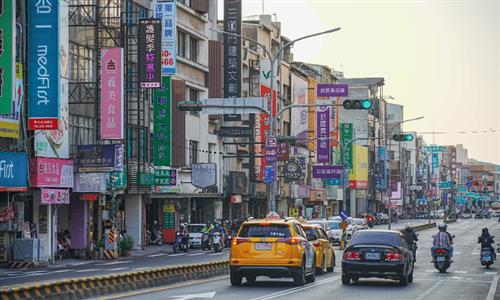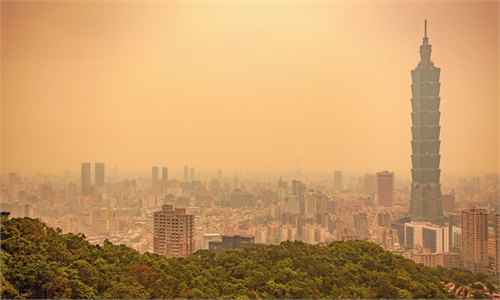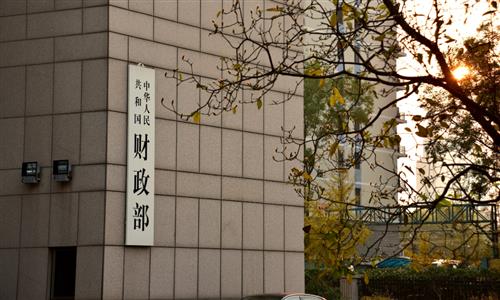Chinese mainland’s suspension of tariff cuts on Taiwan products in line with WTO rules, ECFA: experts
DPP authorities warned against politicization, discriminatory measures

A view of the Taiwan Straits is seen from Xiamen port, in East China's Fujian Province. Photo: IC
Chinese mainland authorities announced on Thursday that preferential tariffs on a dozen chemical products from the island of Taiwan will be scrapped starting on January 1, 2024, in response to Taiwan authorities' unilateral, discriminatory restrictions and bans against mainland exports.
The move is in line with rules under the WTO as well as the Economic Cooperation Framework Agreement (ECFA) between the mainland and the island, as Taiwan's Democratic Progressive Party (DPP) authorities continue to impose restrictions on more than 2,000 mainland products, experts said, warning DPP authorities against politicizing trade issues and undermining cross-Straits trade cooperation.
In a statement released by the Ministry of Finance (MOF) on Thursday, the Customs Tariff Commission of the State Council, the cabinet, said that Taiwan authorities have unilaterally imposed bans and other measures against mainland exports, which violated the ECFA, and as a result it will suspend tariff cuts on 12 chemical products from the island that were granted under the ECFA.
"It is hoped that the Taiwan region will take effective measures to lift trade restrictions on the mainland," the commission said in the statement published on the MOF's website, which contained a list of the chemical products, including acrylic and paraxylene, which are widely used in the manufacture of many chemicals and plastics.
In a statement released shortly after the announcement of tariff suspension, Zhu Fenglian, spokesperson for the Taiwan Affairs Office of the State Council, said that for a long time, DPP authorities have unilaterally imposed restrictions, bans and other discriminatory measures on a large amount of mainland products, in violation of the ECFA's provision on gradually reducing and eliminating tariffs and non-tariff barriers on most goods, which has harmed related industries and enterprises on the mainland.
"We support the relevant competent authorities in taking measures to suspend some preferential tariffs under the ECFA," Zhu said, noting that the DPP smeared the ECFA before it came to power and continued to recklessly change rules, erect barriers and maliciously obstruct and undermine normal cross-Straits economic exchanges and cooperation, seriously hindering the implementation of the ECFA.
Also commenting on the decision, Shu Jueting, a spokesperson for the Ministry of Commerce (MOFCOM), said that the DPP authorities have long used various excuses and means to obstruct cross-Straits exchanges and cooperation.
"This will only squeeze the space for Taiwan's economic development and directly harm the vital interests of Taiwan compatriots," Shu said at a regular press briefing.
In response to the mainland decision on Thursday, the DPP authorities in Taiwan accused the mainland of "economic coercion" and "political manipulation," according to Reuters.
Such accusations from the secessionist DPP authorities are baseless and are attempts to further politicize trade issues in order to undermine normal cross-Straits economic and trade cooperation, experts said.
"The move comes at a sensitive time and could easily be manipulated by DPP authorities; however, the facts are very clear, and the decision is reasonable and in line with both WTO rules and the ECFA," Wang Jianmin, a senior cross-Straits expert at Minnan Normal University, told the Global Times on Thursday.
"The facts are that even as the mainland offered great preferential policies for Taiwan products, the DPP authorities have not only failed to implement the ECFA but have actually adopted discriminatory actions against mainland products."
The Chinese mainland and the Taiwan region signed the ECFA in June 2010 on the basis of the 1992 Consensus on the one-China principle. Under the agreement, which took effect on January 1, 2011, the mainland offered preferential tariffs for 539 Taiwan products, while the Taiwan region would offer preferential tariffs for 267 mainland items.
Under the agreement, as of the end of 2022, the mainland's tariff reductions for Taiwan products had reached 56.06 billion yuan ($8.52 billion), about 8.8 times the tariff reductions for mainland products, according to official data.
In addition to undermining the implementation of the ECFA, the DPP authorities had also imposed restrictive trade measures against a total of 2,509 mainland products as of November, according to the MOFCOM. In April, the MOFCOM launched an investigation into Taiwan's trade restrictions, and it said in October that the probe would be extended to January 12, 2024, citing the complexity of the case.
"The accusation of economic coercion is ridiculous. Economic coercion would mean that what steps the mainland has taken violate WTO rules. That's not true. The mainland's actions conform to WTO rules and provisions of the ECFA. The decision is well-founded," Bai Ming, researcher at the Chinese Academy of International Trade and Economic Cooperation, told the Global Times on Thursday. "It has nothing to do with so-called economic coercion."
The suspension of preferential tariffs for the 12 Taiwan products could also serve as a warning for DPP authorities that they should objectively and correctly view cross-Straits economic and trade exchanges and refrain from taking further actions to undermine cooperation, Wang said.




